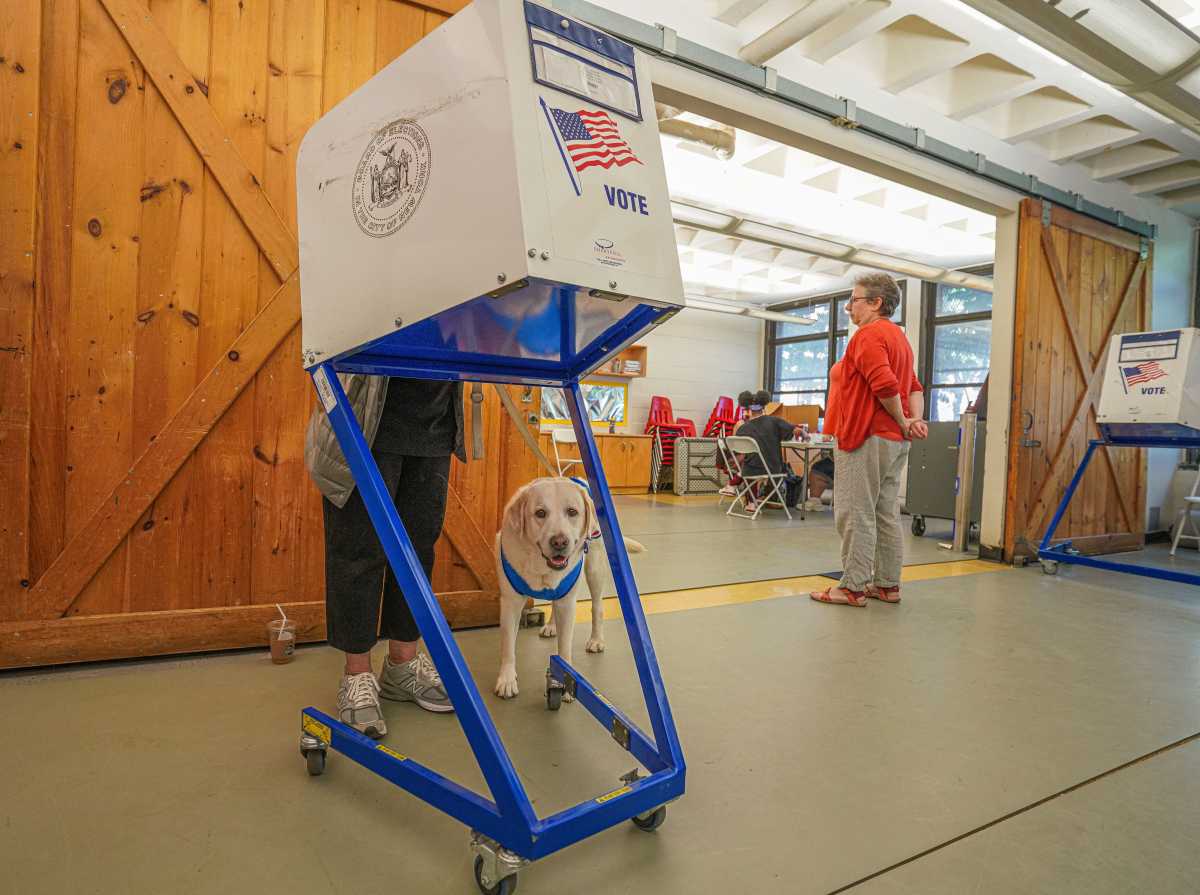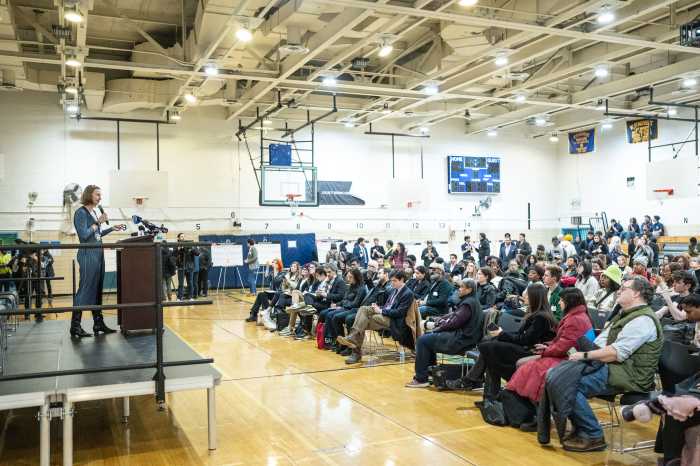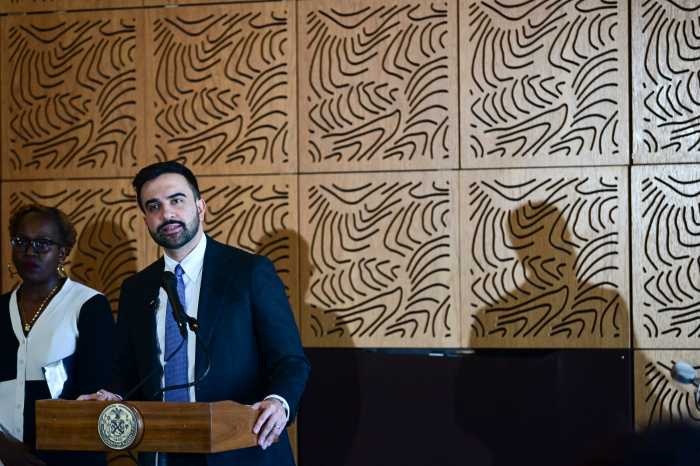New Yorkers are likely to vote on several land-use ballot measures that would limit council members’ local power, but council members are fighting to block the proposals.
A Charter Revision Commission empaneled by Mayor Eric Adams is preparing to advance five ballot proposals: four that would transform the housing development process by fast-tracking affordable housing and limiting councilmembers’ unofficial veto power on local developments (known as “member deference”), and a fifth that would attempt to shift municipal elections to even-numbered years in line with federal races.
At the commission’s final public hearing on Monday, multiple councilmembers testified against the proposed land-use amendments in a bid to retain their local control, arguing that the changes would sideline community input.
Council Member Selvena Brooks-Powers (D-31), who has previously invoked member deference to block affordable housing development in her Queens district, said at the meeting that councilmembers’ guidance serves as a conduit for community members.
“The Council must remain an integral part of the land use decisions in this city,” Brooks-Powers said. “Removing the Council from these processes would undermine accountability, silence local voices, and ultimately lead to worse outcomes for the very communities we all seek to serve.”
“Without the local expertise, we risk building housing without the infrastructure to support it, worsening conditions not improving,” Brooks-Powers added.
While the housing proposals retain input from community boards and the borough president, they shrink the timeline dramatically and shift more power over to city agencies rather than individual councilmembers.
Johana Pulgarin, the district manager of Brooklyn’s Community Board One, said at the meeting that community boards are able to lobby councilmembers and borough presidents under the current system, but the ballot measures would make it more difficult for boards to exert influence.
“Community boards play a vital role in informing local land use plans, providing a democratic and direct voice for local communities to provide input in planning their neighborhoods,” Pulgarin said. “Eliminating or reducing this role could result in the consolidation of planning power with a handful of people, making the land use process less democratic, less informed, poorly planned and more susceptible to corruption.”
But Samir Lavingia, a member of Manhattan’s Community Board Five, said at the meeting that affordable housing has to be a citywide issue, arguing voters should get the final say.
“Our housing crisis does not end at the border of one district and start at the border of another,” Lavingia said. “It is a citywide issue and it’s important that we take a citywide lens. Polling has shown that voters clearly want land use reform and I understand why elected officials are cautious, but it’s important that we take these issues straight to the voters.”
The land-use measures have attracted support from many organizations, including housing advocacy nonprofit Open New York, whose executive director, Annemarie Gray, described member deference as a strategy that keeps “our neighborhoods segregated, exclusionary and expensive” at the meeting.
Union leaders also testified against the proposals, arguing they would concentrate too much power in City Hall and bureaucrats.
“While we emphatically support the construction of more affordable housing, this should not come at the expense of the public’s ability to weigh in on large projects, which employ hundreds of New Yorkers and have significant impacts on the communities where they’re built,” said Candace Tall, executive vice president and political director of 32BJ SEIU, a powerful property workers union.
Michael Piccirillo, area standards manager for NYC District Council of Carpenters, added that despite the proposals’ “noble intentions,” they will encourage mistreatment of workers, limit community input and empower corrupt individuals.
“These proposals cut council members out of the process, favoring city hall and wealthy developers sidelining unions,” Piccirillo. “This won’t create affordable housing, but will incentivize bad actors.”
Department Housing and Preservation Development Acting Commissioner Ahmed Tigani said at the meeting that the proposals maintain community board input, just in an expedited manner.
“Recognizing the scale and complexity of our housing crisis and fair housing challenges, these are tools that we need in order to deliver affordable housing at a speed that the crisis demands,” Tigani said. “We believe that these are measured, reasonable.”
Open primaries face pushback
The commission is also considering a six ballot proposal that would create an open primary system, where primary elections would be open to all registered voters, regardless of party, and the top two vote-getters would advance to the general election. Proponents argue the system, which is in other jurisdictions including California, would enfranchise voters unaffiliated with a party, who are overwhelmingly Black and Latino.
But a surprising coalition emerged against open primaries, including progressive City Comptroller Brad Lander and several Republican councilmembers.
Lander, who also expressed his support for the four housing proposals, implied that the idea is only being floated because former Gov. Andrew Cuomo came in second in the Democratic primary.
“That’s democracy as we have practiced it here for generations,” Lander said at the meeting, referring to traditional primaries. “But now it appears some people — for whom the race didn’t go the way they wanted — want to change the rules.”
Richard Buery, the commission’s chair, tried to remind the public that the commission was “independent.” But all of its members were appointed by Mayor Eric Adams, whom City Council has accused of blocking their own rival charter commission.
“In making our recommendations to the city’s voters, we are bound only by our judgment and by our values,” Buery said. “We have really striven to pursue ideas regardless of who proposed them, regardless of who supports them and regardless of who opposes them.”
Council member Frank Morano (R-51), who has testified at every public hearing since the commission began in December, said the housing proposals were “government overreach” and open primaries would ensure one-party rule.
“Top two is a political trap disguised as reform,” Morano said at the meeting. “It may sound good on paper, but in practice, it shuts out minor parties and discourages outsider candidates in most of the city, it shuts out Republicans — both voters and candidates — and it leaves voters with a false choice.”
The hearing on Monday was the last opportunity for members of the public to testify live, though written testimony is accepted until July 15. The Charter Revision Commission will vote on the proposed ballot measures during a public meeting July 21.





































